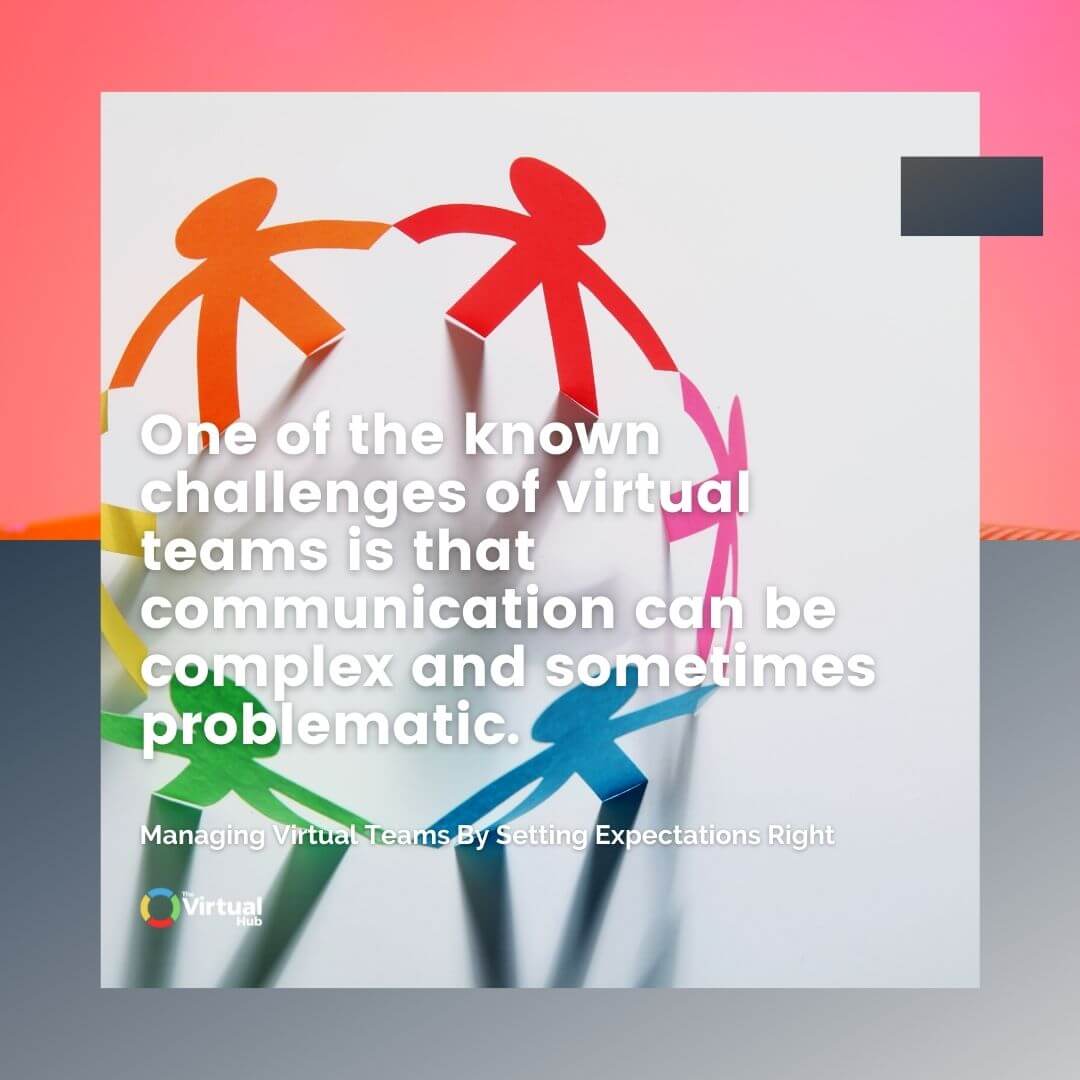Managing virtual teams is no easy feat. It entails juggling people from different locations and tracking what everyone else is doing, which can sometimes seem too much for anyone already overseeing a business.
Entrepreneurs are hesitant to engage a remote team to assist with their firm because they believe the challenges of virtual teams outweigh the advantages. However, engaging a virtual staff is quite advantageous.
One of the most common questions people ask when it comes to thinking about outsourcing remote workers is “What can I expect from virtual teams?”
The question may seem simple at first, but it's quite difficult in reality. If you've worked only in an office setting and never had to do any work remotely before, this is a tough question to answer. The solution to it largely depends on your ability to set expectations for remote workers and define them effectively!
It’s human nature to automatically assume that everybody thinks the same way you do.

This has been the downfall of many a marriage and definitely many a business relationship.
Many relationships fall down with this because of our failure to realise that we all see the world differently. Our expectations of a job well done compared to someone else’s or your team’s could be totally different.
Similarly, for the team member, they might have a different view of what success looks like or what their expectations of you are as a leader.
One of the known challenges of managing remote employees is that communication can be complex and sometimes problematic. And we don’t naturally gravitate to defining our expectations because it is quite difficult to do, especially when you don’t know how. But it is absolutely vital and one of the key success factors for virtual teams.
So during regular team meetings, how do you clearly define your expectations in a way that your virtual team members can successfully meet them?
Just ‘saying it’ is not enough and will lead you down a path of failure.

Here is our ultimate step-by-step guide to setting your expectations when managing virtual teams:
You can click on these links below to jump to a specific section:
- Managing Team Expectations
- Measure the Success of Your Remote Workers
- Communicate Expectations for Remote Employees
- Set Clear Employee Expectations
Catch our Virtual Success Show Podcast on this topic.
1. Managing Team Expectations
Make sure you are able to clearly answer the question “What do you expect from your virtual team?”
Write down your answer. This is important because writing it down makes it more concrete and it doesn’t remain a mere thought in your head.
When you set expectations for a remote employee, make sure you do the following:
First, as the business owner and as a leader, ask yourself, “What’s important to me?” This is different for everyone. For some, it is important to have constant contact, constant communication, almost bordering on micromanagement. For others, it’s about having the deadline met when they said it was going to be met. For others, It’s about thinking outside the box and problem-solving.

Second, understand exactly what leads to success in the task or what leads to success in the role your remote team members are assigned to. You have to be able to clearly demonstrate what success is in terms of task completion or role fulfillment so that you set your people up to succeed and, ultimately, to win.
Third, ask yourself what defines or equates to value for you when this person is performing their role at an outstanding level. What’s valuable to you? What’s going to give you the sense that you’ve got a positive return on investment and not just wasting cash?
Having unclear standards when managing virtual teams can only lead to problems and misunderstandings down the road that can cause a disruption in your workflow and team performance. Managing team expectations early on encourages them to achieve more and help you meet your overall goals.
2. Measure the Success of Your Remote Workers
Managing a virtual team calls for creating clear metrics about what success and what failure look like when it comes to meeting (or not meeting) your expectations.
This is really important from a management perspective both with virtual and local people. You must develop clear metrics on what success looks like and how your team will know if they have succeeded or if they are outside of the scope of success.
It doesn’t have to be over the top, and you’re not looking for fancy ways to record everything. It’s about clearly understanding what you expect, what the metric for success is, and also the metric for failure.

Keep it simple.
It has to be measurable. It has to be black and white. There cannot be a grey area because the grey is where this will come undone and then it makes it really hard for you and for them.
This is one of the key components of managing virtual teams successfully.
Catch our Virtual Success Show Podcast on this topic.
Also Available on The Virtual Hub YouTube Channel. Subscribe Now!
3. Communicate Expectations for Remote Employees
Make sure you communicate and set expectations with your virtual team by presenting them with a written version and by verbally letting them know. Having them repeat your expectations back to you shows their interpretation of what you’ve communicated with them.
Consistent communication is key for working remotely. However, while it is simple, it is not necessarily easy! This is why so many fail in this area and we identify it as one of the key challenges of managing virtual teams.
While some people love (and need) constant communication through the day and as things are happening, others hate that and find it too distracting. They just want the outcome at the end of the day.
Which one are you? Which one is each person on your team?
Set virtual meeting expectations. You have to create guidelines around your preferred communication style and frequency. Don’t just think it, write it down! Then go through it with your people so that they understand and you can have an open discussion about their natural style too.

If they are different from you, they may need more time to adapt and get into your groove. They are not mind-readers so you need to be clear with each other (and not just verbally).
Have a conversation with a written document – allocate meetings to discuss expectations and make a list of how are you are going to meet and measure this together.
In order to set your virtual team up to win, you need them to repeat back to you their understanding of what you expect: Their understanding of what they are going to be measured against, their understanding of what success looks like, of what is an acceptable job, what is an outstanding, and what’s an outright fail at the job.
Honing communication skills in virtual teams in this way can be the simple difference between success and failure.
One thing to always keep in mind is that you are working with a virtual team dispersed in different locations. Hence, it is vital to set clear and specific expectations in globally managing virtual teams and take full advantage of collaboration technologies to stay on top of things and set you and them up to win.
4. Set Clear Employee Expectations
Managing virtual teams entails making sure that your expectations of them are realistic for the role that you’ve invited them into your business to fill!
Are they in the right seat on the bus? Does their skillset mean they are capable of working within expectations and serving the business effectively? Get clear on that so you don’t try to put a round peg into a square hole.
What if your expectations are completely out of alignment with the level of the role? So, for example, you’ve hired a VA but what you really need is a business coach or a digital strategist to help you to create business growth. Your expectations can be misaligned with the role you have decided to hire for and so damages your virtual team effectiveness.
You have to find and match the right person with the right skillset to what you expect and what you need. Sometimes it might be a restructure internally, sometimes you may have to let a few people go and re-employ based on what you expect from the role. This is really about learning to understand the principles of effective team working and effective team management skills.

Some people confuse a cheaper staff member with a strategist or a coach, who can think of a strategy for them. A VA can implement a lot for you (and most of our The Virtual Hub VAs can even come up with ideas in collaboration with our internal team for you) but they cannot replace a strategist or coach in your business.
If you are thinking about going virtual, outsourcing or simply bringing a virtual assistant into your business, then it is really worth spending the time to learn how to lead virtual teams effectively otherwise you risk losing a lot of time, energy and money.
A Final Note
Setting your expectations with your remote staff is a major initial step in managing virtual teams. Making your team know in a clear manner what their roles are, what they are expected to achieve, and what they can contribute to your business leaves no room for misunderstandings and incorrect assumptions. It’s only when everyone is on the same page with you that your goals can be reached with minimal issues and disruptions.
For more information on how you can make the most out of your virtual team, visit our Ultimate Guide to Virtual Assistants. The guide walks you through each aspect of what a virtual assistant is and how they work including thorough explanations on how you can hire virtual assistants, how to effectively manage virtual assistants, and how you can maximize the use of them.
Achieve Entrepreneurial Freedom in 5 simple but very powerful steps.
